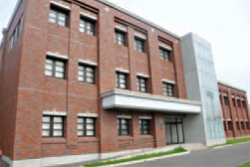Advanced Course

The advanced courses of this school were established in April 2004?and consist of the Production System Engineering Course and Environmental?System Engineering Course. These advanced courses aims to educate engineers?who are able to play a role in complex areas by deepening the expertise they?learned in their five years of college education together with allowing them?to acquire knowledge in a wide range of fields. Moreover, students learn?practical skills (e.g. design skills, skills that combine technologies?from differing fields and communication skills) through project-based learning (PBL),?which is one of the initiatives that characterizes this course.?When students complete these two-year courses and receive certification through a review by the?National Institution for Academic Degrees and University,?they are able to acquire a bachelor of engineering degree.?Furthermore, when students complete the four-year?“Combined System Engineering Education Program,”?which combines a two-year special course and the four/five-year regular course,?they will be recognized as an engineer with practical?skills capable of playing a role on the global stage who has completed a?JABEE-certified program.
●Production System Engineering Course
The Education in the Production System Engineering Course is based?on the fundamental knowledge of mechanical engineering, electrical?and electronic engineering or computer engineering learned in the regular courses.?The course aims not only to make students deepen their knowledge in each specialty,?but also to nurture engineers who possess an engineering design ability?that can resolve problems from multifaceted perspectives.
●Environmental System Engineering Course
The Environmental System Engineering Course is based on the basic?knowledge of material engineering and environmental urban engineering?learned in the regular course and aims to systematically deepen expertise?in both fields together with educating practical engineers capable of?applying expertise in both to problem-solving.
●Admission Policies
The Advanced Course seeks to further improve the specialized knowledge and?techniques acquired in the Regular Course, as well as to foster engineers who?will contribute to the advancement of society. Hakodate National College of Technology?looks forward to the enrollment of students that possess the qualities listed below.
★ Individuals who want to work for the good of humankind and society.
★ Individuals who take the initiative to improve themselves through?autonomous and continuous study and research.
★ Individuals who possess the fundamental skills in science, technology,?mathematics and English required to receive education as an engineers.
●Objective(Mission)
Building on the educational basis obtained from the National Colleges of?Technology, the Advanced Course seeks to cultivate professionals who will?make broader contributions to the advancement of industry.?Through a detailed and in-depth curriculum,?the course conducts education and research for high-level,?specialized knowledge and skills related to industry.